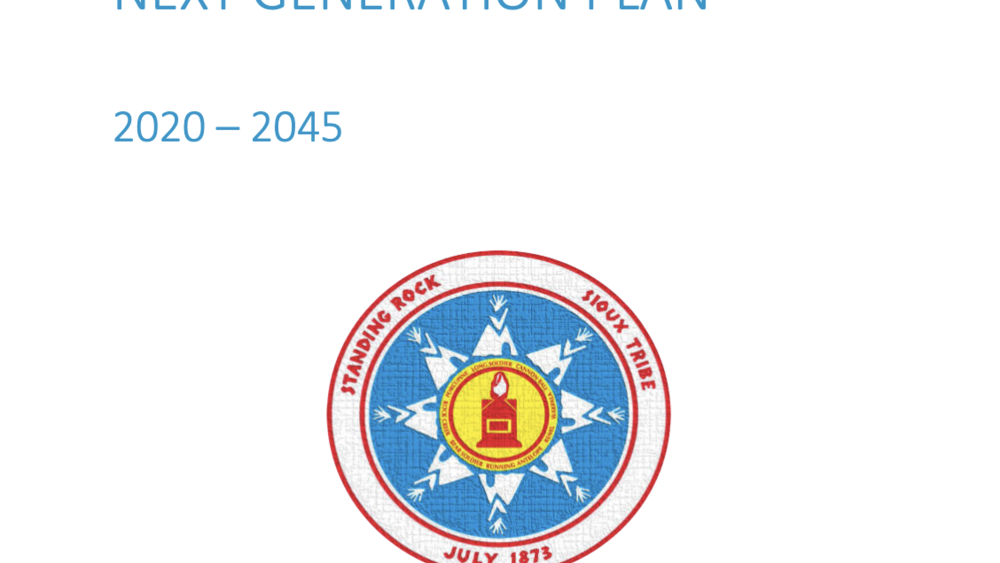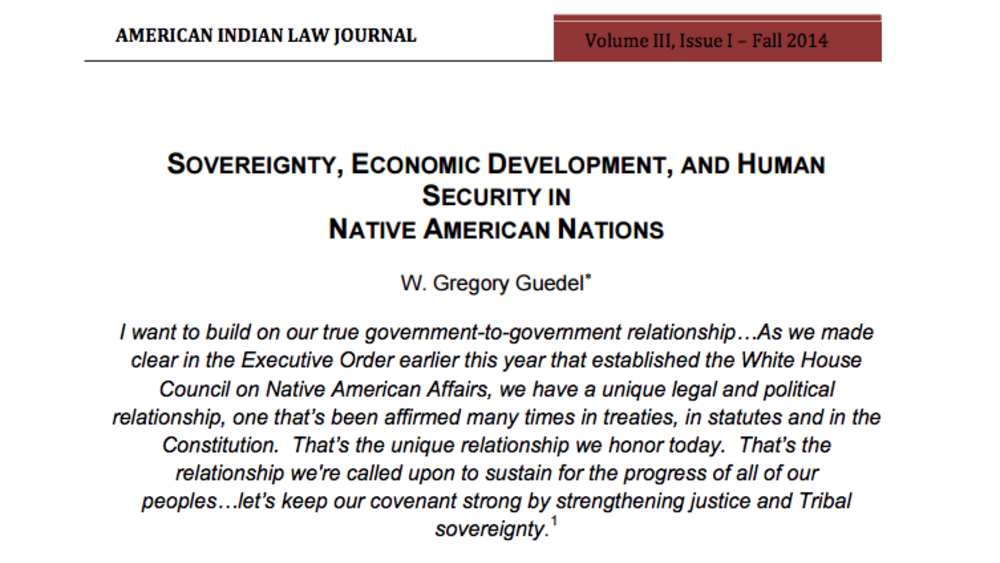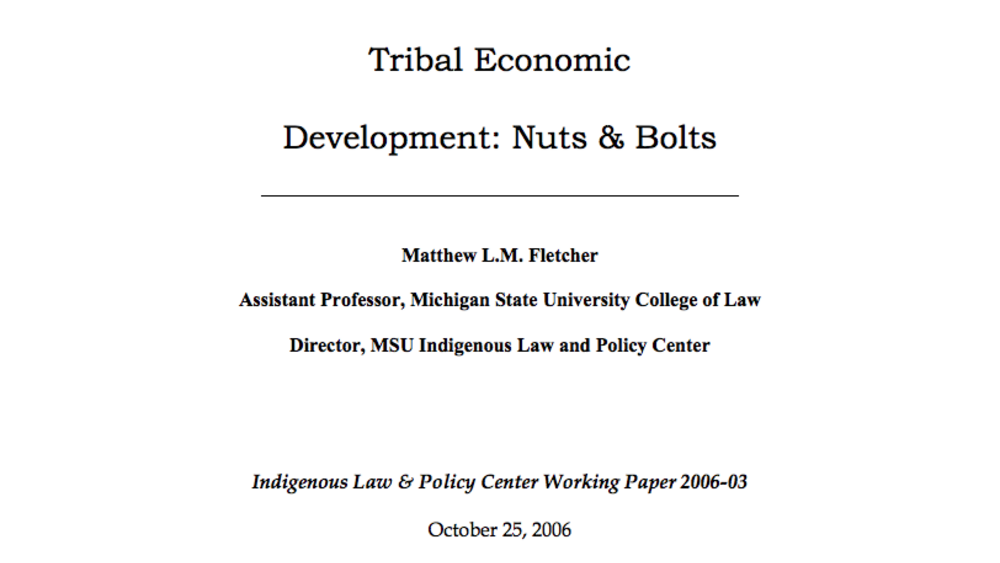Economic development specialist Roger Boyd (Navajo) reports back to his fellow Honoring Nations symposium participants the consensus from his group regarding some strategies that Native nations should think about and pursue in order to build a sustainable framework for economic development.
Additional Information
Boyd, Roger. "Economic and Community Development." Honoring Nations symposium. Harvard Project on American Indian Economic Development, John F. Kennedy School of Government, Harvard University. Sante Fe, New Mexico. February 8, 2002. Presentation.
Transcript
Roger Boyd:
"My name's Roger Boyd. I'm a member of the Navajo Nation and currently I work for the CDFI [Community Development Financial Institution] Fund, which is a part of the Department of the Treasury in Washington, D.C. And I want to thank Andrew for inviting me to participate these past couple of days. It's really been good. I think it's always good to get out of Washington, D.C. and come down to where the real action is and I really appreciate all the different activities and conversations I've had. Also, by way of introduction, I'd like all the individuals who participated in the Economic and Community Development breakout session to please stand. I think there's some folks up here. Would you please stand, please, that participated in the economic development sessions? Now, one of the reasons I wanted these folks to be recognized is that early on in the discussion of our breakout session we talked about the difference between those that have authority and those that are leaders. So the distinction is, is that if you're elected or appointed to do something you have the authority, but the real leadership is from the folks who appointed you or elected you to do that. So I wanted you to know that those are the leaders, I'm the authority having to address you this afternoon.
The breakout session was to discuss economic development, and for those of you that really work in the field of economic development, it's like herding cats. Everybody has a definition and an opinion on economic development and the interesting thing about it that I have found over the past several years is that everybody is just about right when it comes to their definition of economic development, because it could involve education, it could involve business development, it can involve tribal court systems, it can involve good legislation to create a good environment within the community to do good economic and community development. And our discussion pretty much covered the gamut this morning. I'll hit some of the high points and where we sort of ended up in the discussion and I'm sure a lot of you, I felt like the discussion was just getting heated up and we were really getting to know each other and beginning to really define some of the crucial elements of community and economic development and then we had to take a break. But I'm sure the discussion will continue for many days and years to come I hope.
We started talking about power, which was sort of an interesting concept and our leader admitted that it was a very harsh and probably the worst word to start out with, but we all let him take his time and explain to us what he thought it was all about and he did a good job until we really got into the discussion. The discussion then began to take on another element, which I thought was very, very important because we started talking about leadership, identifying who you are, where you're going. In other words, it really takes a very clear vision of leadership and not only a clear vision of that leadership, but the willingness of taking on the responsibility to move forward on strategies and action in which to carry out that vision.
There was a lot of discussion about the differences and the level of sophistication and knowledge in economic development. I thought this was very, very important in our discussion because we were talking about, I think, the importance of having really well educated and people who have really good experience working with folks at the grassroots level, and it was very I think well pointed out to us the difference between education and having knowledge. I think one lady in the audience said, 'Well...' She'd met some very educated people who really didn't have very much knowledge and vice versa. Those who do not have formal education that are there on the forefront working day in and day out on these issues really, really were the people with the knowledge to make some of these things happen.
We also then began to talk about the importance of moving forward with economic development and how do you take the knowledge, the experience you have within your community, and try to work with other communities whether they be within your tribe, within your reservation but also regionally and nationally. There was a lot of discussion about that and I think that one of the points that I think was very well made was that we are not all on the same level. There's a lot of differences within our own communities with regard to this knowledge and the sophistication of doing economic development and that's not to say that we shouldn't respect that, we have to work with that. I think that we talked about the importance of working at the grassroots level and defining that level of the economy compared to the level that I think many tribes are being exposed to today through the profits of gaming and the development of natural resources. That's a different level but it's all within the continuum, it's all within that part of the economy and there's a lot of integration that goes on. A lot of times, and what we talked about was the emphasis sometimes is just placed on the vertical aspect of development and community development and capacity building, but I think we had a really good consensus that equally important, if not more important in a lot of situations, is the horizontal transfer of this knowledge and of this experience of trying to help each other out, not only within our tribes but from tribe to tribe, from region to region throughout the country.
We talked a little bit about timing, how important timing was. We talked a little bit also about the common denominators that exist throughout Indian Country. And probably I think one of the strongest common denominators is just our cultural values. I think that we share very much, and it doesn't matter whether you're a tribe from the northeast or Alaska or the southwest, one of the things that really is common among all of us is our traditions and our culture. And I think that that's the binding aspect that keeps us moving forward within our communities and throughout our relationships throughout the United States.
The question that was posed to us is how do we take all of this knowledge and all of the experience that you folks have demonstrated over the last couple of days and how do we reach out? How does the Harvard Project reach out to other tribal communities throughout the United States and to try to work with them? One of the points that was made was that we really should reach out and look at other regional tribal organizations. I think what has happened here today and the experience that has been demonstrated and has been shared, there is a real, there's a gap I believe, and we discussed a little bit in our breakout session is the communication. How do we reach out and start working with other tribal organizations throughout the United States? And I think that that's the next step. And all of us I think in one form or another belong to some of those regional organizations, whether it be ATNI [Affiliated Tribes of Northwest Indians] up in the northwest or USET [United South & Eastern Tribes, Inc.] or the Intertribal Council of Arizona and Nevada. These are all good organizations and actually one of the studies that we conducted, we rely heavily on those regional organizations because that is the continuum of the communication between us and the regional organizations and hence with the tribal organizations.
But I also think that another very, very important point that was made was not only of the similarities, but the differences and that what one tribe is able to do for themselves today does not necessarily automatically transfer to another tribe because there are differences. Just like Europe, I think somebody pointed out in one of our discussions and I think this is really true, a lot of people, you know, 'When you see one Indian, you've seen them all'. What was pointed out was, 'Well, it's like Europe. If you see a Frenchman, he's not a German.' And I think that that happens so often in this country and that when people look at us and they meet us, then they think they've met all of us when in fact they have just...this is a compliment to our friends from Alaska -- they've only seen the tip of the iceberg. But at any rate, I think that was a very important aspect of it and that pretty much concludes our presentation. It was a good team. Thank you very much."



